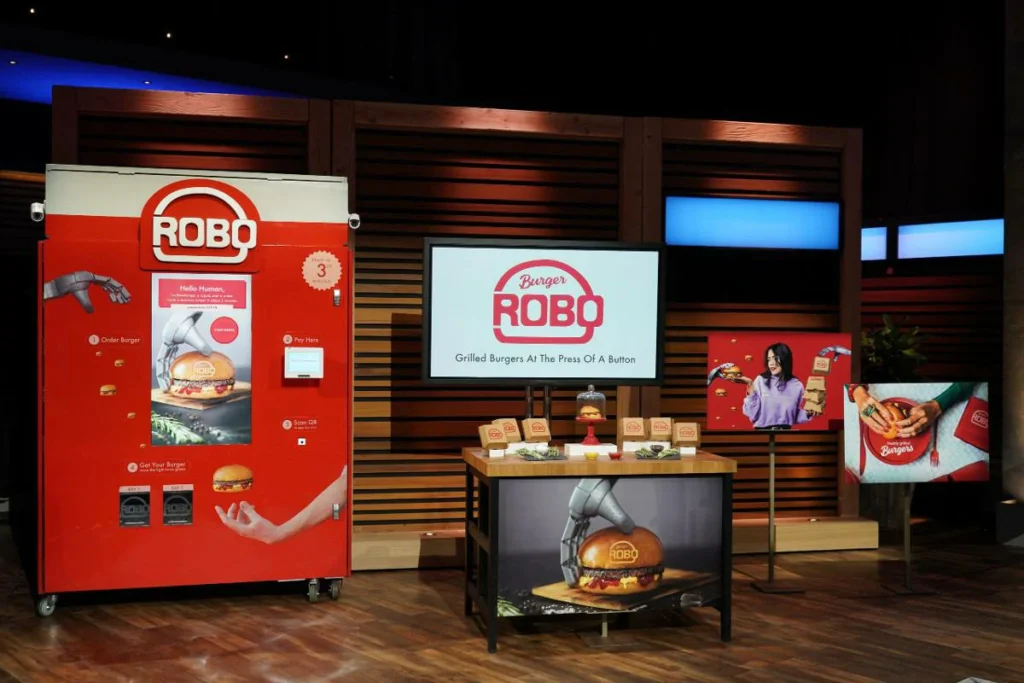What was the outcome of RoboBurger’s appearance on Shark Tank Season 15? RoboBurger successfully secured a $1.5 million investment from Kevin O’Leary and Michael Rubin on Shark Tank Season 15. The deal was structured as a loan at market interest rate for 9% equity.
Summary
- RoboBurger, the world’s first fully automated burger-making vending machine, appeared on Shark Tank Season 15.
- The company successfully secured a $1.5 million investment from Kevin O’Leary and Michael Rubin.
- The deal was structured as a loan with a 9% equity stake for the investors.
- RoboBurger aims to revolutionize the fast-food industry with its innovative technology.
RoboBurger Shark Tank Update | Shark Tank Season 15
RoboBurger is the world’s first fully automated burger-making vending machine. Encased within a 12-square-foot box, this innovative machine crafts restaurant-quality burgers from scratch in approximately six minutes.
From toasting the buns and grilling the patty to adding fresh toppings and condiments, RoboBurger handles the entire cooking process without any human intervention. The result is a hot, delicious burger available 24/7, with a customizable menu to cater to individual preferences.
The Rise of Automated Restaurants
The concept of automated restaurants isn’t entirely new. In recent years, we’ve witnessed the emergence of various technologies aimed at streamlining restaurant operations, from self-ordering kiosks to robotic arms preparing meals.
The COVID-19 pandemic further accelerated this trend, as contactless service and reduced labor costs became paramount concerns for restaurant owners. RoboBurger represents a significant advancement in this field, demonstrating the potential of automation to transform the fast-food industry.
RoboBurger’s Mission
RoboBurger’s mission is to revolutionize the way people access fresh, convenient food. By automating the entire burger-making process, they aim to:
- Increase Accessibility: Provide 24/7 access to freshly cooked burgers, regardless of location or time.
- Reduce Costs: Eliminate the need for extensive staff, leading to lower prices for consumers.
- Improve Consistency: Ensure consistent quality and taste in every burger.
- Enhance Hygiene: Minimize human contact with food, reducing the risk of contamination.
- Expand Options: Offer a wider range of menu items and customization options.
Shark Tank Season 15 Appearance
1. The Pitch
| Details | |
|---|---|
| Entrepreneurs | Audley Wilson, Andy Stern, Dan Braido, and Joseph Galanti |
| Business | RoboBurger |
| Ask | $1,500,000 for 5% equity |
| Deal | $1,500,000 loan at market interest for 9% equity |
| Sharks | Kevin O’Leary, Michael Rubin |
| Season/Episode | Season 15, Episode 21 |
| Original Air Date | September 29, 2023 |
| Website | RoboBurger |
| Key Points of Pitch |
|
| Why Sharks Accepted |
|
2. The Sharks’ Reactions
The Sharks were initially intrigued by RoboBurger’s innovative concept and the potential of the technology.
They were impressed by the quality of the burgers produced by the machine and recognized the potential market demand for such a product.
However, concerns were raised regarding the high cost of the machines, potential competition from established fast-food chains, and the need for regulatory approvals.
3. The Deal
Ultimately, Kevin O’Leary and Michael Rubin saw the potential in RoboBurger and offered a $1.5 million investment, but structured as a loan with a 9% equity stake.
This deal allowed RoboBurger to secure the necessary funding for expansion while mitigating some of the risks associated with a traditional equity investment.
The founders accepted the deal, marking a significant milestone for the company and setting the stage for its continued growth in the automated restaurant space.
Investment Details
1. Investment Amount
RoboBurger secured a substantial $1.5 million investment on Shark Tank, a significant boost for the budding company. This funding is poised to propel the company’s growth and expansion plans.
2. Equity Stake
The investment deal, however, was not a straightforward equity exchange. Instead, it was structured as a loan at the prevailing market interest rate.
In return for this loan, the investors received a 9% equity stake in RoboBurger, aligning their interests with the company’s future success.
3. Investors
The $1.5 million investment came from two prominent “Sharks”: Kevin O’Leary, known for his sharp business acumen, and Michael Rubin, a seasoned entrepreneur with a proven track record in the retail industry.
Their combined expertise and financial backing are expected to provide RoboBurger with valuable guidance and resources as it navigates the competitive fast-food landscape.
RoboBurger Technology
1. How It Works
RoboBurger’s technology is a marvel of automation. The entire burger-making process, from grilling the patty to toasting the bun and adding toppings, is executed by a sophisticated system of robotic arms and sensors.
This ensures consistency, efficiency, and hygiene throughout the process. Customers simply place their order via a touchscreen interface, and the machine springs to life, crafting a personalized burger in a matter of minutes.
2. Ingredients and Menu
RoboBurger emphasizes the use of fresh, high-quality ingredients in its burgers. The menu offers a variety of classic and customizable options, allowing customers to tailor their burgers to their liking.
While the specific details of the ingredients and menu items may vary, the company prioritizes using locally sourced produce and premium meats whenever possible.
3. Safety and Hygiene
Food safety and hygiene are paramount concerns for RoboBurger. The automated nature of the burger-making process minimizes human contact with the food, reducing the risk of contamination.
The machine is also equipped with self-cleaning mechanisms to maintain a sanitary environment.
Additionally, the company adheres to strict food safety regulations and guidelines to ensure the highest standards of quality and safety for its customers.
Market Potential
1. Target Market
RoboBurger’s target market is vast and diverse. It aims to appeal to busy individuals seeking quick, convenient meal options, such as students, office workers, and travelers.
The company’s 24/7 availability and placement in high-traffic locations like airports, college campuses, and shopping malls make it easily accessible to a wide range of consumers.
Additionally, RoboBurger’s customizable menu caters to various dietary preferences and restrictions, further expanding its potential customer base.
2. Competitive Landscape
The fast-food industry is highly competitive, with numerous established players and emerging trends. RoboBurger faces competition from traditional fast-food chains, as well as other automated restaurant concepts.
However, it differentiates itself through its unique value proposition: a combination of convenience, affordability, customization, and hygiene.
The company’s innovative technology and focus on fresh ingredients also set it apart from many competitors.
3. Growth Strategy
RoboBurger’s growth strategy centers on expanding its presence in key markets and increasing brand awareness.
The company plans to deploy its machines in strategic locations with high foot traffic, partnering with property owners and businesses to maximize exposure.
Additionally, RoboBurger aims to invest in marketing and advertising campaigns to educate consumers about its benefits and attract new customers.
The company also plans to explore partnerships with other businesses and organizations to expand its reach and offerings.
Challenges and Concerns
1. Public Acceptance
One of the main challenges facing RoboBurger is gaining public acceptance for its fully automated concept.
Some consumers may be hesitant to try food prepared by a machine, citing concerns about taste, quality, and the lack of human interaction.
Overcoming this skepticism through effective marketing, positive reviews, and demonstrations of the machine’s capabilities will be crucial for RoboBurger’s success.
2. Technical Issues
As with any technology, RoboBurger’s machines may encounter technical glitches or malfunctions.
Ensuring reliable performance and quick resolution of any issues will be essential to maintain customer satisfaction and prevent disruptions to service.
The company will need to invest in robust maintenance and support systems to address these challenges effectively.
3. Regulatory Hurdles
The automated restaurant industry is still relatively new, and regulations may vary across different regions and jurisdictions.
RoboBurger will need to navigate complex regulatory landscapes, ensuring compliance with health and safety standards, food handling regulations, and other legal requirements.
This may involve working with regulatory bodies, obtaining necessary permits and licenses, and adapting to changing regulations over time.
Future Plans
1. Expansion
RoboBurger’s ambitious vision extends beyond its initial success on Shark Tank. The company aims to expand its footprint across the United States and eventually reach international markets.
This expansion strategy includes targeting high-traffic areas like airports, stadiums, universities, and corporate offices, where the demand for quick, convenient meals is high.
RoboBurger also envisions partnering with established brands and franchises to integrate its technology into existing food service operations.
2. Product Development
While the current RoboBurger model focuses on burgers, the company has plans to expand its menu offerings. This may include introducing new types of sandwiches, wraps, or even breakfast items, all prepared by the automated system.
RoboBurger also aims to leverage customer feedback and data analytics to continuously improve its recipes and customize offerings based on regional preferences and trends.
3. Partnerships
Collaboration is key to RoboBurger’s growth strategy. The company seeks to establish partnerships with suppliers, distributors, and other businesses in the food industry.
These partnerships can help streamline operations, access new markets, and develop innovative products.
For instance, RoboBurger could partner with a beverage company to offer a complete meal solution or collaborate with a technology firm to enhance its automation capabilities.
RoboBurger Reviews
1. Customer Feedback
Early customer feedback for RoboBurger has been generally positive. Many users praise the convenience, speed, and taste of the burgers.
The customizable options and 24/7 availability have also been well-received. Some customers have noted that the burgers are comparable in quality to those from traditional fast-food restaurants, while others appreciate the novelty and futuristic aspect of the experience.
2. Media Coverage
RoboBurger has garnered significant media attention, both before and after its Shark Tank appearance.
Numerous publications and news outlets have featured the company, highlighting its innovative technology and potential to disrupt the fast-food industry.
The media coverage has been instrumental in raising awareness about RoboBurger and generating interest among potential customers and investors.
3. Expert Opinions
Industry experts have offered mixed opinions on RoboBurger. Some see it as a promising innovation with the potential to transform the way people access food, while others express concerns about the impact on jobs and the potential for technical glitches.
However, most agree that RoboBurger represents a significant step forward in the automation of the food industry and could pave the way for further advancements in this field.
FAQs
How much does a RoboBurger cost?
Prices may vary depending on location and customization options, but typically range from $6 to $10.
Where can I find a RoboBurger machine?
Currently, RoboBurger machines are available in select locations across the United States. Check the company’s website for the latest updates on locations.
Is RoboBurger safe and hygienic?
RoboBurger prioritizes food safety and hygiene. The automated system minimizes human contact with food, and the machine is regularly cleaned and sanitized.
Can I customize my RoboBurger?
Yes, you can customize your burger with various toppings, sauces, and cheese options.
The Bottom Line
RoboBurger’s appearance on Shark Tank and subsequent investment mark a significant milestone for the company. While challenges and uncertainties remain, the potential for RoboBurger to revolutionize the fast-food industry is undeniable. Its innovative technology, focus on convenience, and commitment to quality ingredients have resonated with consumers and investors alike. As RoboBurger continues to expand and evolve, it will be interesting to see how it shapes the future of fast food and automation in the culinary world.








